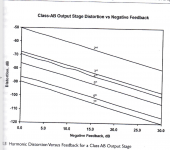Those wars still stem from lack of deep, true understanding. If we all had the same knowledge base, I believe the discussion wouldn't be so tense. But even for me who is not deep into electronics, its pretty clear who are struggling and who has a grip. Ego and self-confidence are obvious drivers. But it is very educational to follow the discussions - thanks to you who have the stamina to flag for knowledge!!
//
//
Which is what?Contrary to what most believe, many (not all) designers that use
predominantly ZFB topologies are not technically incompetent fools, they just
prefer the sonic outcome.
I have no idea who Martin Colums is. I do however know of a Martin Colloms and his strange double life between respected speaker designer and believer that lead free solder has ruined sound.
Correct, it was Terry, do I get the blame for a software failure? 🙄^You certainly have an issue with quoting...
I don't think Mark Tillotson wrote this.
[...]for low levels of nonlinearities (as in every competently designed audio amplifer before closing the loop), [...]
Why close the loop then?
Apart from the academic goal to reach even lower distortion, there is the drawback of carefully avoiding oscillation under all possible use cases.
And the amp with the closed loop cannot be identified anyway in a controlled, blinded listening test.
Unless someone comes now up with tangible data...
All this anti feedback nonsense was given wings in an article written by Martin Colums in c. 1996 in Stereophile (‘A Future Without Feedback’) which regrettably presented a lot of false information. It’s been regurgitated ad infinitum for the last 25 yrs.
Most valuable in this thread for me is to learn something of posters; the way they think and communicate.
I hate it when people don't take the effort to spell names right, especially when they quote fellow countrymen....
Above mentioned article was written by Martin Colloms, not Colums 😱
Already in 1980 Colloms wrote "High Performance Loudspeakers", a very well written overview of loudspeaker technology. Not much has changed since.
🙂 React is the wordI know, I must have posted this umpteen times, but hey, people only read the very last post and then react out of context ...
Is attributing distortion to linear elements having linear relationships and applying it to a strongly nonlinear physical system conceptually disturbing? How can an invariant linear scale system express distortion? How can a linear theory deal with or explain nonlinear occurrences?
That's why we have measurements, funny how people are so reluctant to post the measurements of their wonderful sounding amplifiers, or even talk about them for that matter.
I hate it when people don't take the effort to spell names right, especially when they quote fellow countrymen....
Whereas I get peeved when people wont read 5 posts back...
Perhaps to get D.C. offset and drift within acceptable bounds.Why close the loop then?
Maybe it is a good reason.Maybe this is a good reason? Courtesy Bob Cordell.[...]
Maybe not.
That linear relationship between say -20dB distortion (bad) to -40dB distortion (better) to -xxdB distortion (detection threshold) stops to be linear for us humans below a certain level, and extrapolation is simply futile.
For great measurement gear, it certainly stops much much lower down, but I fail to understand why that should be important, since I use amps to amplify music for my pleasure and not for academic reasons.
Nobody until now pointed me to a scientific, controlled listening test where people could identify two amps, one with -60dB THD (eg the loop open) and the other showing remarkably less (eg the very same amp but with the loop closed) with music.
(Btw is that really a "competently designed amplifier" at -50dB H2 with 0dB FB?)
(Btw 2, I know that graph, it's not that I don't follow the thread. But the discussion drifted away some pages ago, with insults like "brainless" and similar so that I stopped posting. It's really below any discussion standard)
Last edited:
Thanks Brian, yes that is of course an advantage.Perhaps to get D.C. offset and drift within acceptable bounds.
My greatest issues with drift/offset are however with phono preamps, where even Scott Wurcer proposed an open loop approach AFAIR...
Maybe, for a good reason, you are "somewhat" on my ignore list.....
It's mutual.
(Btw 2, I know that graph, it's not that I don't follow the thread. But the discussion drifted away some pages ago, with insults like "brainless" and similar so that I stopped posting. It's really below any discussion standard)
The discussion drifted away 5 years ago. Someone re-awoke the zombie.
Last edited:
- Home
- Amplifiers
- Solid State
- Global Feedback - A huge benefit for audio
